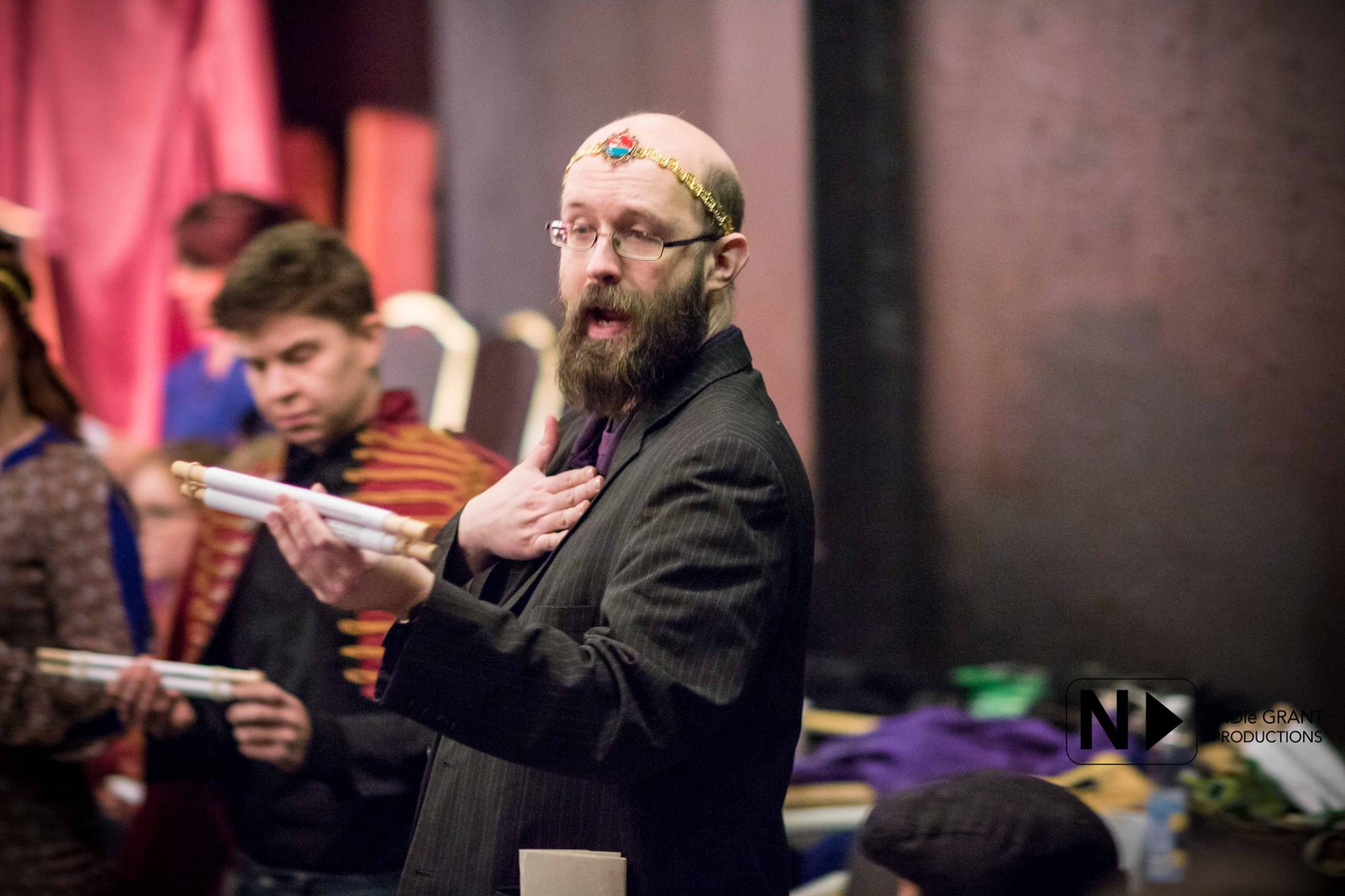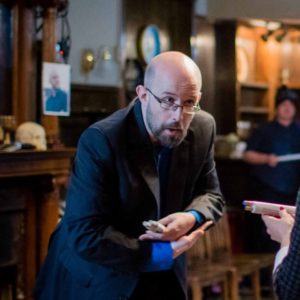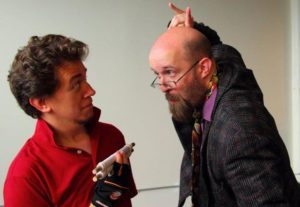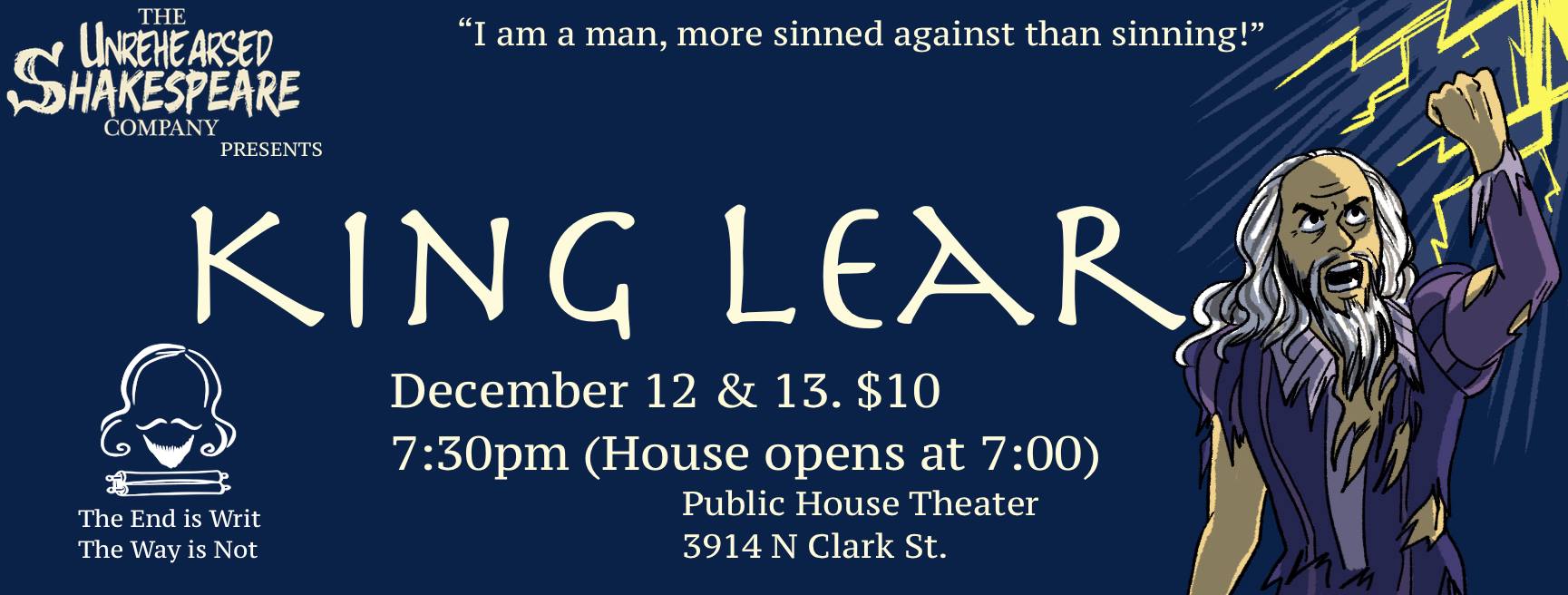
 Mike is an Unrehearsed veteran of ten years who has performed in such plays as Antony & Cleopatra, All’s Well that Ends Well, Hamlet, and Merry Wives of Windsor. You can see him as a special guest performer in King Lear on Monday and Tuesday, December 12th and 13th.
Mike is an Unrehearsed veteran of ten years who has performed in such plays as Antony & Cleopatra, All’s Well that Ends Well, Hamlet, and Merry Wives of Windsor. You can see him as a special guest performer in King Lear on Monday and Tuesday, December 12th and 13th.
Q: What first turned you on to Shakespeare?
MIKE: We can credit Bill Kincaid for this one. I did some Shakespeare classes – both acting and literary – in undergrad, but really never got into Bardiness before working with Bill at WIU. As soon as he introduced SVO, my game brain latched on and I was hooked.
Q: How has your approach to Unrehearsed altered over the years?
MIKE: I’ve become more and more comfortable using the audience as a buddy or a sounding board. Earlier on I spent a LOT of effort on keeping the text onstage and actively tried to keep my focus off the audience…but frankly, they’re the ones paying to see the show, and in shared light they KNOW I can see them, so why not engage?
Q: What, to you, is the most intriguing thing about King Lear?
MIKE: There’s so much factional interplay – your casting breakdown gave instructions for 5-6 different costume colors based on allegiances – but it all comes back to the personal. “How loyal is this person to me, and how do I know?” becomes a key question for every character I can think of, especially the ones who get it wrong.
Q: How would you compare Unrehearsed to conventional theater?
MIKE: I’d quibble and say that it’s still conventional theatre – just with a different set of conventions. And those conventions are a huge part of the fun: playing the Unrehearsed game, following the Unrehearsed rules, and accepting the results. I don’t know WHY this speech switches from “thou” to “you” in a single sentence, but I don’t have to know why; I just need to follow that coded instruction in an observable way that the audience can follow. Maybe my scene partner and I will find a purpose for it, or maybe we’ll stay confused, but the audience doesn’t need our comprehension, only our acting.
Q: Has Unrehearsed influence your teaching techniques at all?
MIKE: Yes – Unrehearsed has really hammered in the importance of observing what’s actually happening in the room, focusing on students rather than on curriculum. That’s been an immensely useful lesson in teaching performance (stage combat in particular; I think those two disciplines reinforce each other nicely), and anything else: all my prework says I need to be across the stage from the speaker, but she’s got a crown and she just said “we,” so I guess I’m over by her now. OK, now what? My plan said today’s class was going to start choreography, but half the class is still cutting incorrectly? Choreo gets pushed back a bit, and technique gets more time. What’s next? Unrehearsed trains you to acknowledge where you ARE, not where your notes said you’d be.
Q: What’s your favorite Unrehearsed role to date?
MIKE: Malvolio is the only role I’ve done twice, and it was a blast both times. Of course, there was something like 8 years between iterations, so…

Q: What else is coming up soon?
MIKE: Chicagoans should know about two stage combat opportunities in January: the Winter Wonderland Workshop and its associated Intensives (www.macenfp.org/#events), and Destruction in Decatur, a downstate two-week workshop that offers skills tests (http://destructionindecatur.
===== 
